I’ve managed PPC campaigns for nearly 20 years and one of the questions that I’ve answered most often is “Why should I bid on my brand name?”.
It’s a fair question because most of the time a brand is going to rank really well organically for their own brand name, most likely in the top organic position. So why should you pay for ads on a search where you already appear #1 on that SERP? It turns out that there are several good reasons to bid on your brand terms, no matter how well you rank organically.
For clarification purposes, I’m only talking about your own brand… not brands of products that you sell. For example, I’m talking “Amazon”, not the millions of brands available on Amazon.
#1 Control Your Brand Messaging
Paid ads give you complete control over the copy that customers will see when searching for your brand name. You can typically control organic results through basic page title and meta descriptions, but search engines have been know to edit those to some degree and even choose completely different copy.
This is also important in cases where your brand might have some negative press coverage or other negative content that’s ranking on page 1. Having a paid ad there with positive messaging, in addition to your organic listing, gives you a better chance of making a good impression.
Bank of America is a good example here. Searching simply for their brand name yields just a single ad with their site also in the first organic position.
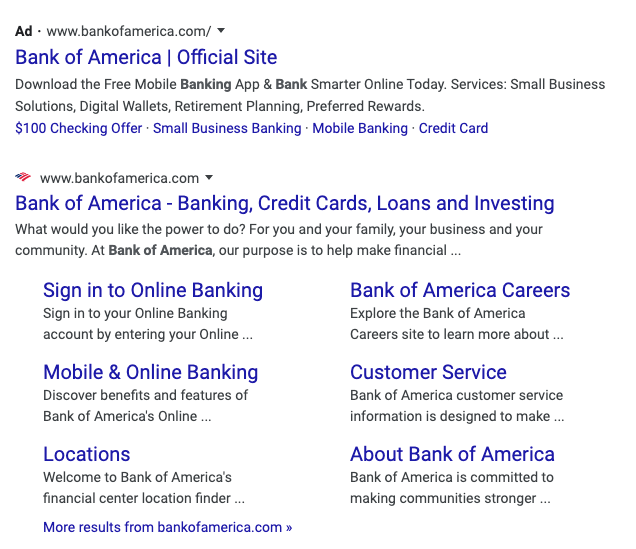
However, at the bottom of page 1 they have 2 negative articles.
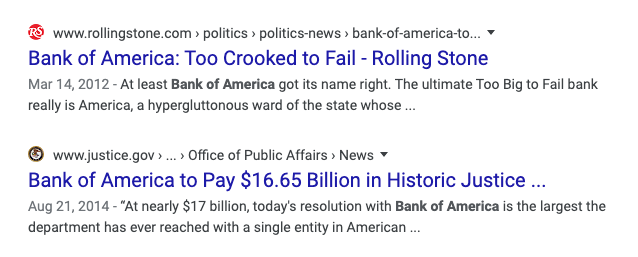
By running a paid ad with positive brand messaging they are better able to control what users are seeing. All it would take is someone scrolling further down the page to see the negative results, but the additional positive result in the paid ad helps improve their odds of a positive first impression.
If your company has any negative coverage on, particularly on page 1 of the SERPs, then you should consider running paid ads, even if you don’t typically run paid ads at all.
#2 Control More of the SERP Real-Estate
Closely-related to point #1 above, branded ads allow you to control more real estate on the SERP. At a basic level, more real estate on the SERP means that you’re more likely to get traffic through any of the individual channels.
S’well is a great example of controlling SERP real estate.
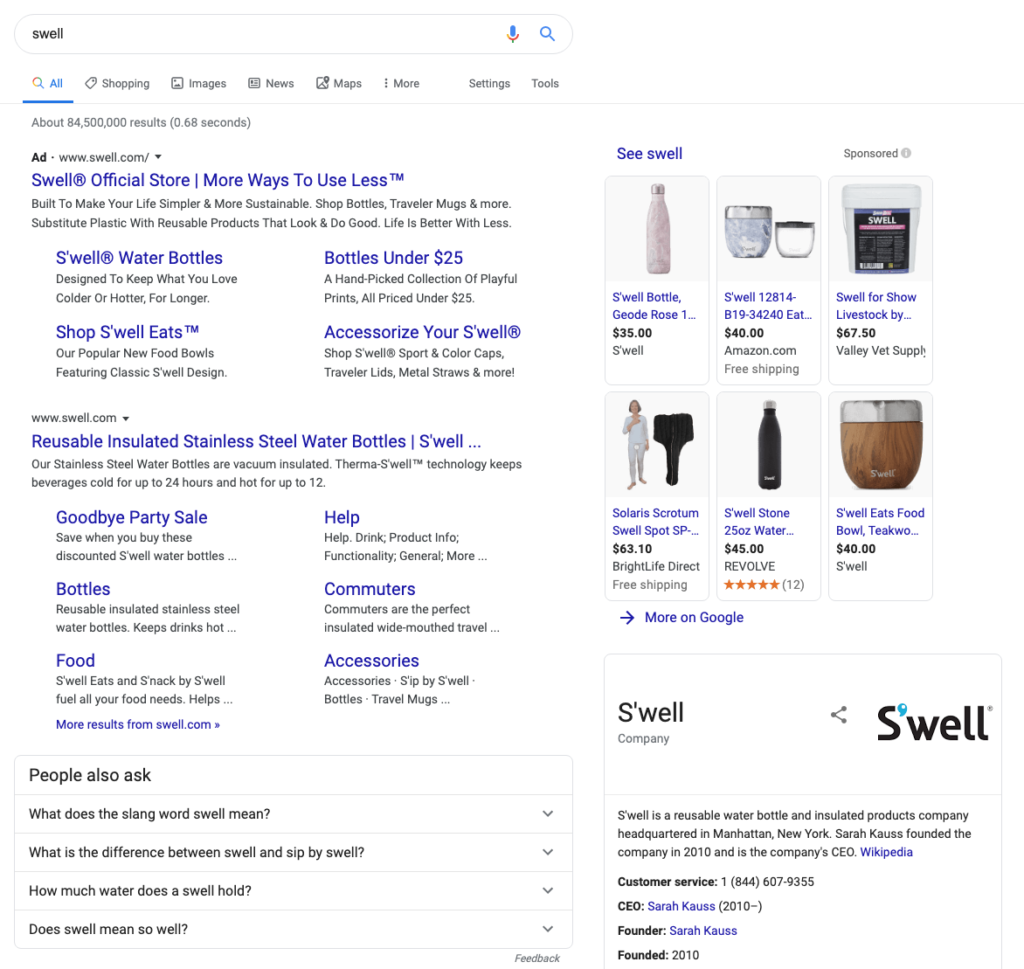
S’well is a very well-known brand that has products available for purchase from their own site as well as countless other large retailers. This allows them quite a lot of control on their branded SERP.
Notice how they have a paid search ad at the top of the page, Google Shopping ads on the right-side, the top organic search result and a knowledge panel lower-right. Just about anywhere on this page that someone would click would be beneficial to S’well.
#3 Ward Off Competitors
The larger your brand is the more likely you are to see competitors try to take advantage of your branded searches. Bidding on competitor terms is extremely common and often one of the best ways to reach a target market.
That makes it even more important to bid on your own brand terms. You want to make sure that your site is shown along with your competitors.
Shopify is a great example of these. Notice how Shopify occupies the 1st ad slot and the 1st organic slot. It wouldn’t look great if the top 3 ad slots were taken by competitors and you had to scroll down to the organic listings before you ever saw Shopify.
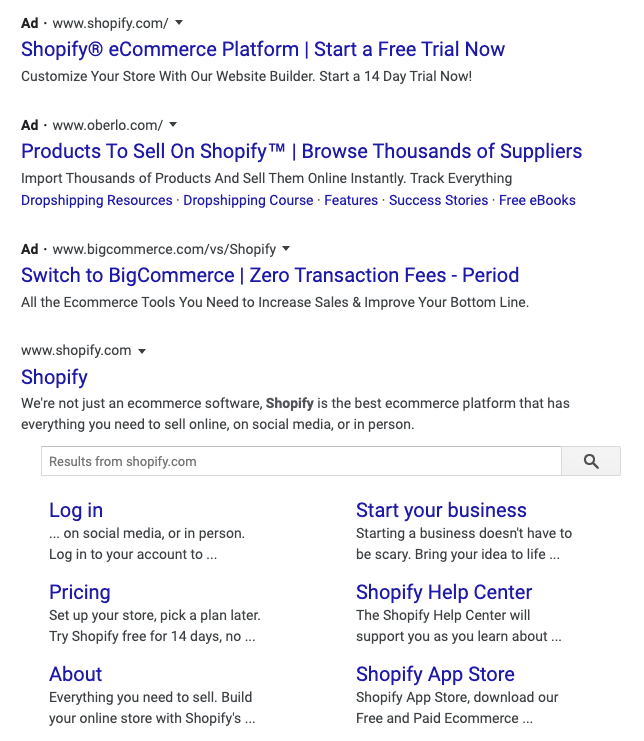
#4 Low Cost, Big Returns
One of the chief concerns that I see from clients is that they don’t have the budget to spend on branded terms. There are 2 reasons that this argument is flawed.
Branded Ads Don’t Cost Much
First, branded search ads cost very little compared to the rest of the ad account. Most brands simply aren’t large enough for branded search traffic cost to take up a large portion of the spend on the account.
Based on accounts that I’ve worked, branded campaigns take up about 0.5% of account spend (for new or little-known brands) all the way up to 10-12% (for very well-known brands in their industry).
Huge ROAS
Branded search campaigns typically earn a much better return than the rest of the ad account. To give you a little background data to chew on, branded search campaigns for my ecommerce clients typically receive about 200% better ROAS than non-branded campaigns.
Here’s some data from Deep Field clients for Q4 2019. This is aggregate data across 10 different ecommerce accounts. ROAS in this example is 3X better on branded terms, while only being about 5% of the spend.
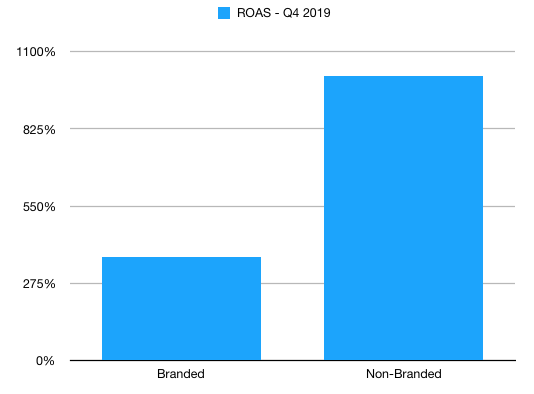
The question I always ask my clients is “Given how well branded search converts, can you afford to NOT run these ads?“.
#5 Potential Crossover Impact of PPC and SEO
Paid ads don’t directly influence organic search rankings, but there is some notable indirect impact. Several studies have shown that paid ads increase organic clickthrough-rates.
The same thinking here holds for both branded and non-branded queries, so feel free to keep bidding on non-branded terms that you already rank well for.
How I Structure Branded Search Campaigns
Branded search campaigns are the simplest and most straightforward campaigns that you’ll have in your Google Ads account.
I always have a dedicated campaign just for brand terms. I do this so I can easily see how well the branded terms as performing, but more importantly, so I can see how the non-branded terms are performing. Keeping them separate keeps the reporting clean.
Within that branded search campaign I have just a single ad group. There are some (rare) instances where multiple ad groups are needed, such as having multiple distinct brands owned by the customer. For the vast majority of accounts this will be just 1 ad group.
As for keywords, keep it simple. For brands that have a 1-word name I just bid on the phrase match term “mybrandname”. If the brand has a 2-word name then I bid on something like “mybrand name” and “mybrand name”. The actual name of brand will hopefully make this obvious for you.
Final Thoughts
Hopefully I’ve given you a lot to think about when it comes to bidding on your brand terms. There are many very valid reasons for bidding on these, while the only reason not to bid on these is a very tight budget.
What do you think? Do you have a differing view? Leave any questions in the comments!
Leave a Reply